The Science Management and International Affairs Office collaborated with the Japanese Language Department, FPT University (Can Tho) to hold the seminar “Japanese corporate culture from the perspective of Vietnamese culture” via Google Meet on August 21, 2021, intending to help students in better understanding Japanese corporate culture as well as provide them with skills, behavior, and discipline in accordance with Japanese standards.

Japanese corporate culture from the perspective of Vietnamese culture
Corporate culture has recently emerged as a significant issue in many businesses. It is a crucial element in determining the long-term viability of many businesses. As a country that is both modern and traditional, Japan places a strong emphasis on professionalism in the workplace and good manners while interacting with others. The workplace culture of Japan is quite true to itself and emits a courteous and serious quality. Today, many Japanese businesses have developed successful and very effective workplace cultures. It is another feature that has helped Japanese businesses rise to the top of their respective industries.
On August 21, 2021, the Science Management and International Affairs Office collaborated with the Japanese Language Department, FPT University (Can Tho), to organize a seminar titled “Japanese corporate culture from the perspective of Vietnamese culture,” with the sharing of Associate Professor Dr. Nguyen Chi Nghia, Faculty of Business & Law, Aomori Chuo Gakuin. The seminar aimed to assist students in approaching and learning about the working culture in Japanese enterprises.
Nearly 100 faculty members and students from FPT University attended the program, along with Assoc. Prof. Dr. Nguyen Chi Nghia, Dr. Huynh Van Bay (Academic Head, FPT University Can Tho), Ms. Le Thi Kim Oanh (Head of Japanese Department, FPT University Can Tho), Ms. Ho Thi Thao Nguyen (Acting Head, Science Management and International Affairs Office).
Dr. Huynh Van Bay said during the program’s opening: “Today’s seminar provides an opportunity for students to experience, exchange, and learn about the unique Japanese culture and work habits despite the difficult circumstances of the epidemic.” He also expressed his gratitude to Prof. Dr. Nguyen Chi Nghia for participating in the program.
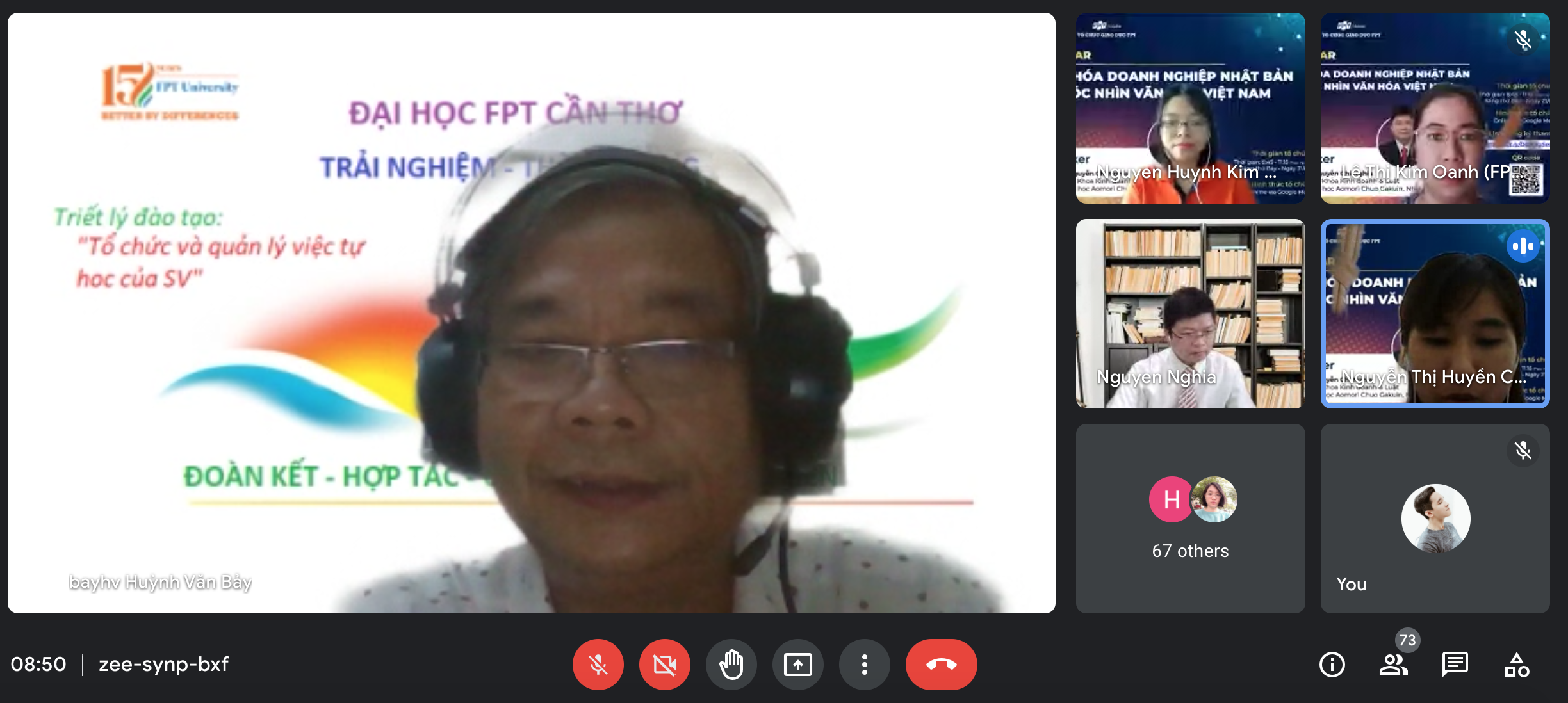
Assoc. Dr. Nguyen Chi Nghia is currently working at the Faculty of Business & Law, Aomori Chuo Gakuin University, Japan. Assoc. Dr. Nghia conducted study on Japanese education, positive psychology management, and business administration’s approach to reducing poverty and resolving social issues. In addition, Prof. Dr. Nghia frequently serves as a link for economic and cultural exchanges between Vietnam and Japan. He also works with corporations, organizations, and students to carry out a variety of social projects that benefit both Vietnam and Japan.
Participating in the program, Assoc. Prof. Dr. Nguyen Chi Nghia shared his experiences in helping Japanese language students better understand the beauty of Japanese corporate culture. The seminar’s two main themes were the culture of traditional Japanese enterprises and the “standard deviation culture” of some contemporary Japanese corporations.
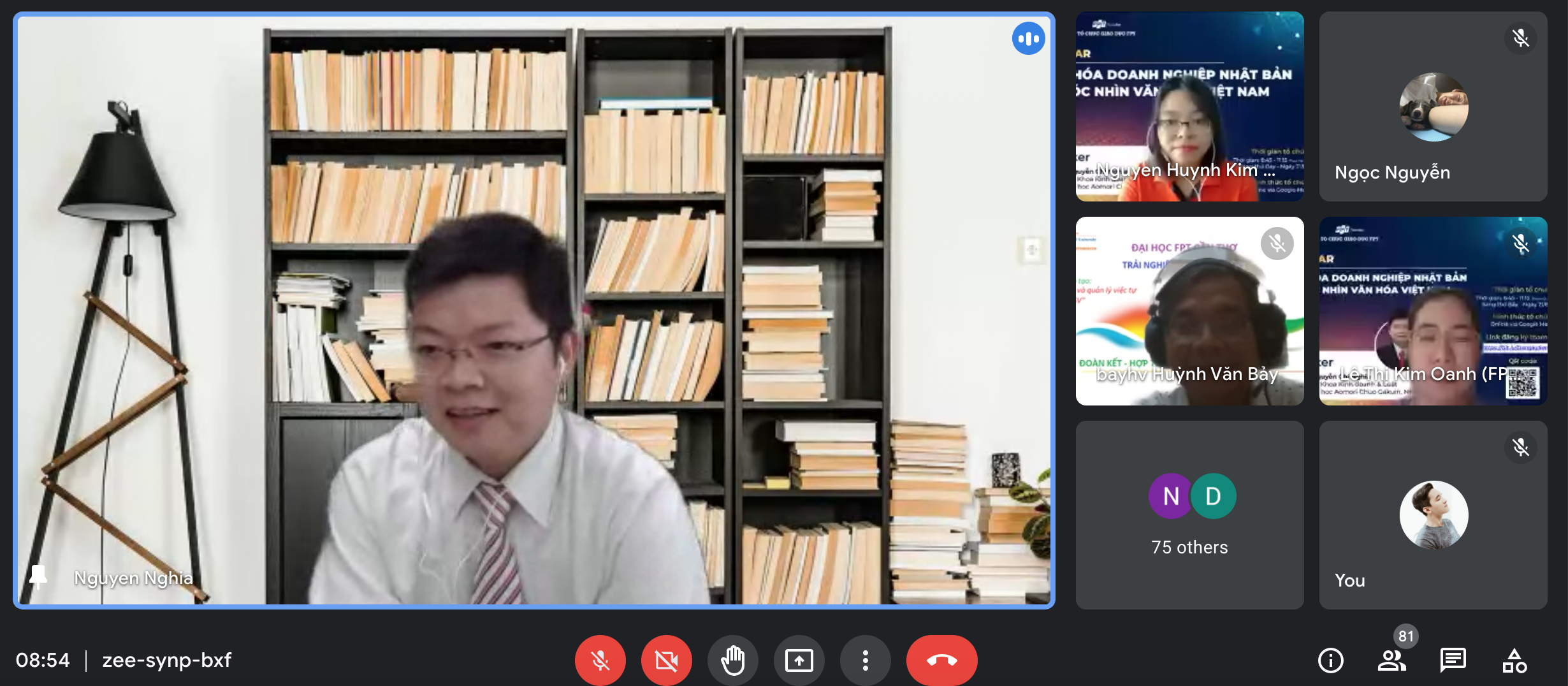
Standard and non-standard culture of a Japanese business
From a young age, the Japanese are taught the virtues of kindness, benevolence, and thinking for others. As a result, Japanese standard enterprises, like Itochu or Yakult firms, will be businesses and corporations that operate not just for profit but also consumers and society. Even if every Japanese company had this cultural beauty, there would still be instances of fraud or distortion of data in settlement of large corporations (Toshiba, Nissan, Subaru, etc.), as well as the establishment of the Black Company (*). Vietnamese persons, particularly students, who want to work for a Japanese company should be aware of the differences between a Japanese company’s standard and non-standard cultures in order to act appropriately.
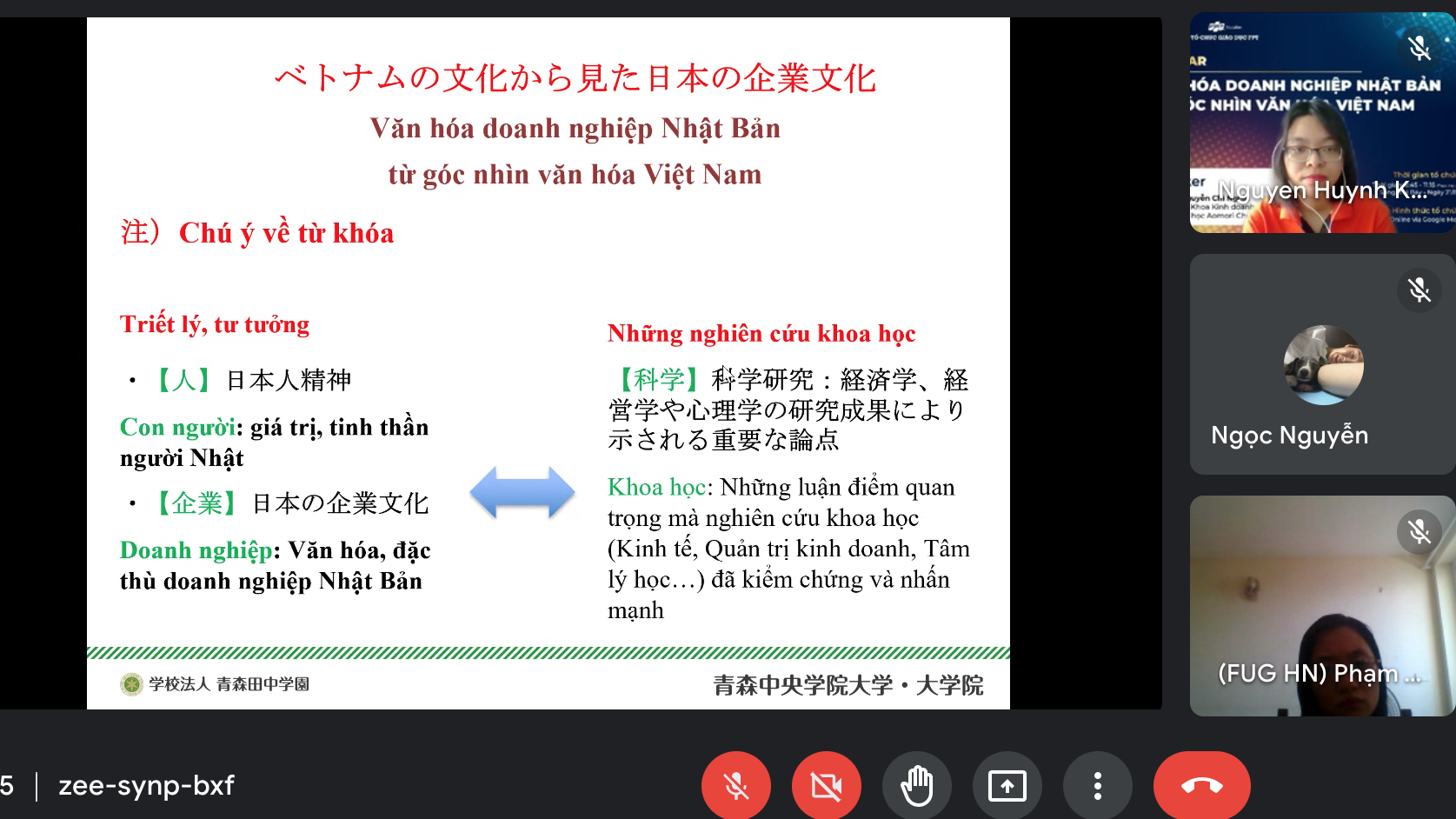
Enterprise evolution
When dealing with environmental issues, whether you are a Japanese or Vietnamese firm, you must first endure the below challenging stages before realizing corporate social responsibility (CSR). Mr. Nghia used this example to show the “evolution of enterprises.”
Stage 1: Maximize profits while ignoring the pollution issue caused by your company.
Stage 2: Passively accepting pollution control, leading to cost money but ineffective.
Stage 3: Awareness of environmental protection issues and proactively producing environmentally friendly products.
Stage 4: Going beyond environmental protection, making profits while developing and contributing to society.
Therefore, it is impossible to hold Vietnamese businesses accountable for failing to pay attention to social issues on a widespread scale, but we must acknowledge that as a result of the country’s unique economic and cultural circumstances, businesses in our nation have not really advanced in their CSR awareness.
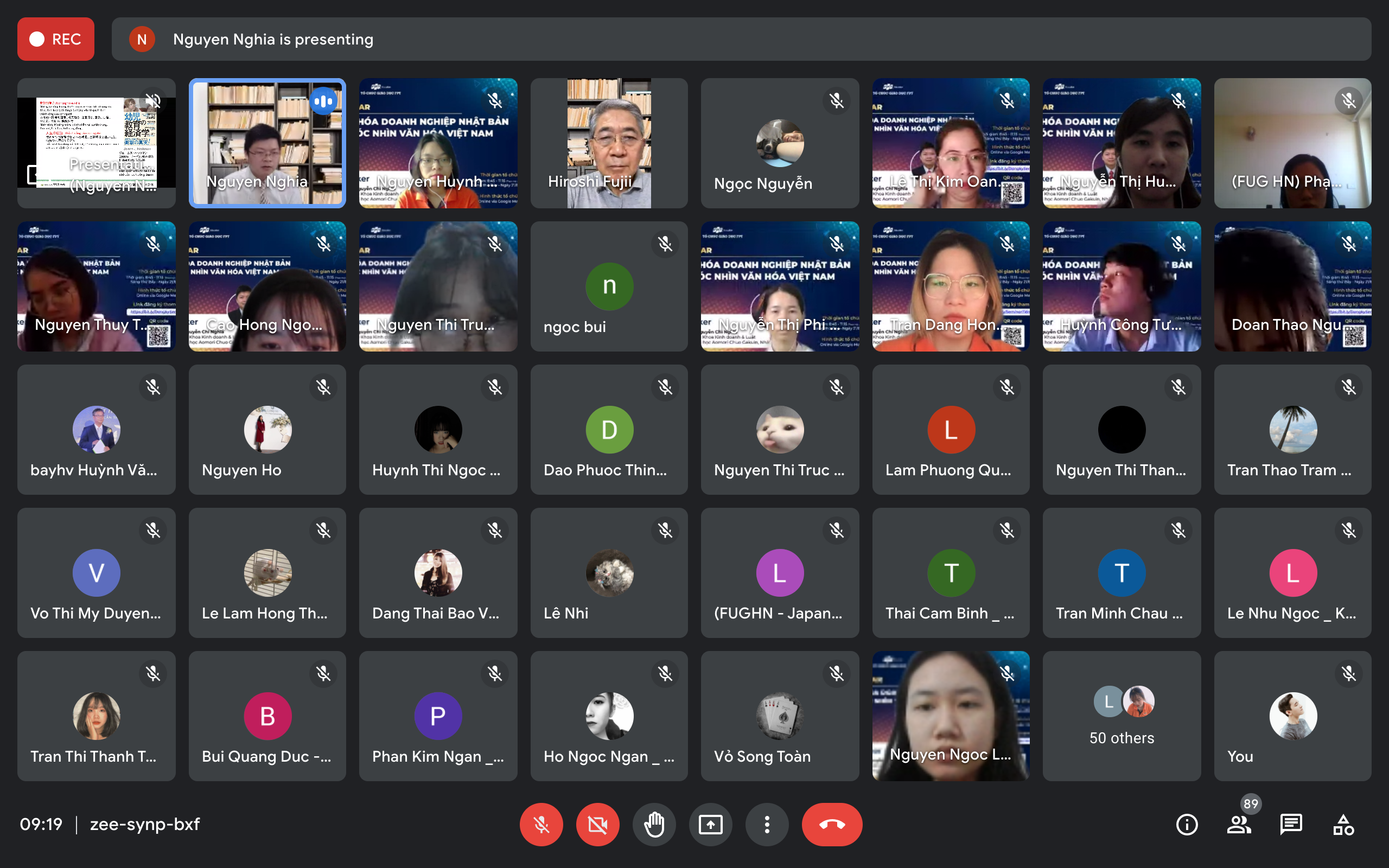
Lessons learned for Vietnamese students
Following Mr. Nghia’s presentation, the speakers responded in-depth to the students’ inquiries about Japanese corporate culture. The teacher specifically responded “yes” when a student inquired if a group of people’s attitudes and personalities have a direct impact on the culture or growth of a firm. Just because a group of people with a “non-Japanese” attitude can cause the downfall (culturally) of an entire enterprise. Capitalist exploitation or legal fraud of a few large corporations today is the individual’s responsibility, but the group still bears the consequences. From there, it is clear how individuals and groups thought to relate to one another.
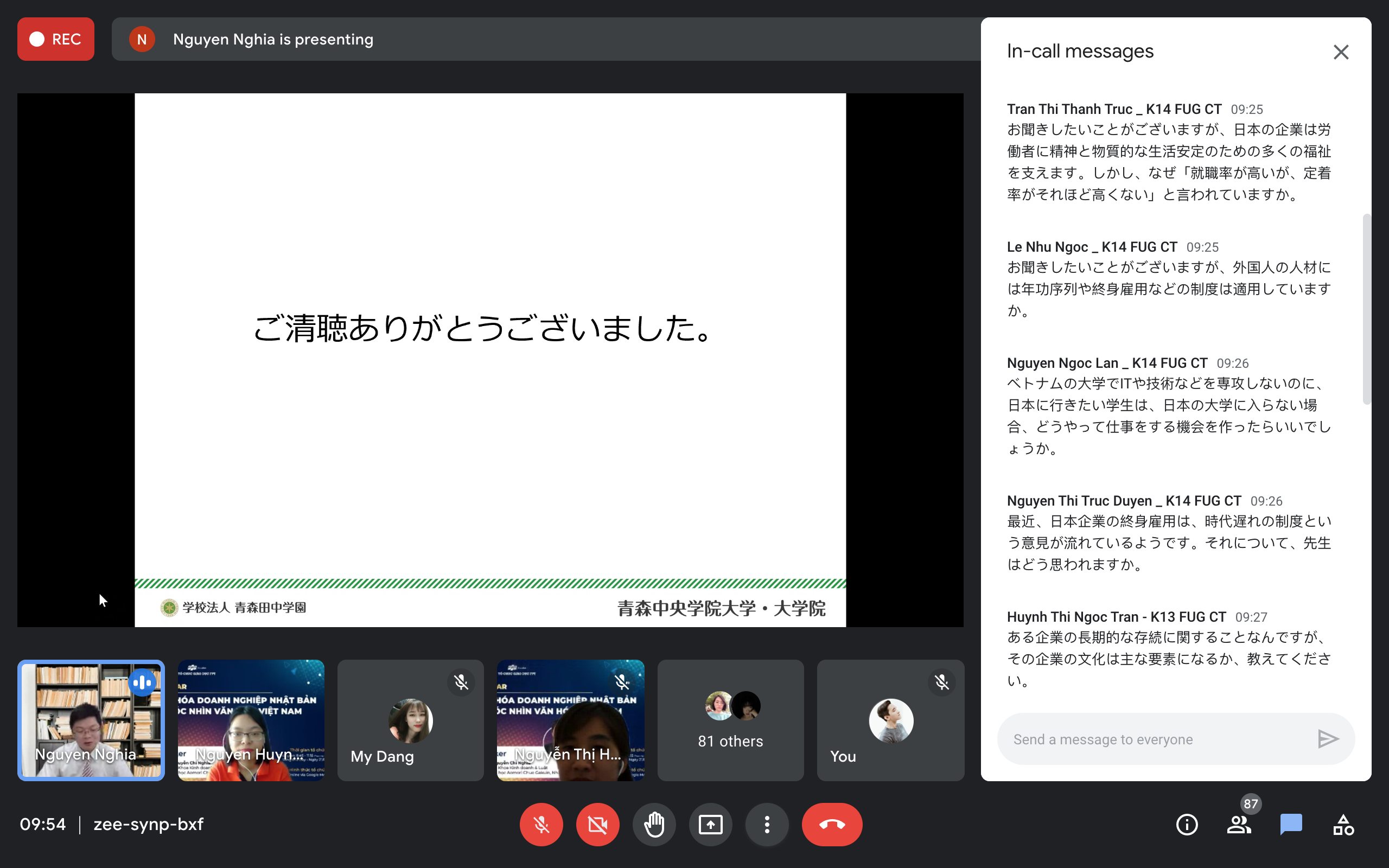
Nguyen Huynh Kim Ngan, a Japanese student (FPT University, Can Tho), shared, “This is my first time participating in a genuine Japanese-style seminar held in Vietnam. Even though the lecture only lasts for two and a half hours, Mr. Nghia undoubtedly imparts a lot more knowledge than that. Regarding the content shared by the speaker, I admire the Sanpo Yoshi (三方よし – All three are good) business philosophy of Omi merchants (**), which is: Good for sellers, Good for purchasers, and Good for society. This is the basic foundation of a standard Japanese business. Through today’s session, I gained a lot of unique insight into Japanese business culture from a Vietnamese person’s point of view. Thanks to that, I now have a better understanding of the Japanese workplace and how to pick a solid employer to secure my long-term career.”
Students at FPT University have learned fascinating and valuable aspects about Japanese company culture thanks to the lecture. This will be a useful tool for preparing future graduates to engage in the global business environment, particularly in Japanese firms and companies that are modern, dynamic, and equally disciplined.
Note:
(*) The common popular appellation for Japanese businesses with unfavorable working conditions, safety violations, subpar benefits, and slow or no pay
(**) People from Omi (now Shiga Prefecture, Japan) walked from one province to another to sell goods in the Edo period.
Source: https://cantho.fpt.edu.vn/sinh-vien-dai-hoc-fpt-trai-nghiem-van-hoa-doanh-nghiep-nhat-ban-qua-seminar-van-hoa-doanh-nghiep-nhat-ban-tu-goc-nhin-van-hoa-viet-nam


